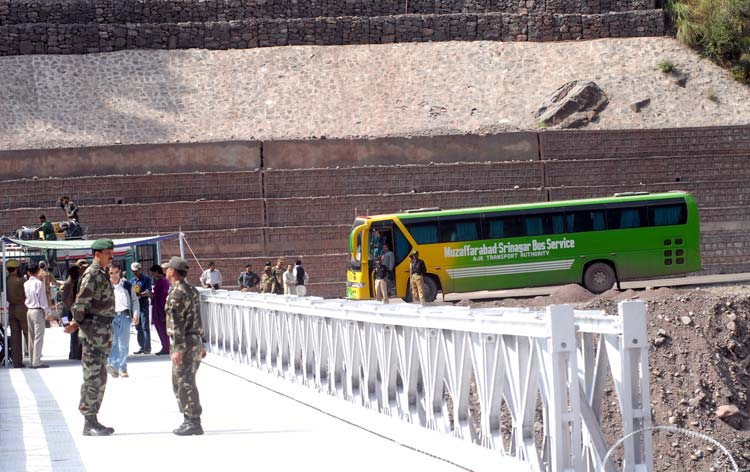Insha Bint Bashir

A free movement curbed half a century ago got partially resumed in the spring of 2005. On April 7 that year, the two nuclear giants of sub-continent exchanged buses to bridge the gap of divided Kashmir. The Bus service from Srinagar to Muzaffarabad was kick started. And with that, people assembled near Salamabad Bridge in Indian-administrated-Kashmir to meet their parted ones. Those separated as young (in 1947), were having reunion with grey heads—filled with nostalgia. They were creating buzz around while standing in a queue. Blood relatives of those, who were devoured by guns stationed at the line of control, had also turned up. And one among them was an old Mouj—the wandering ‘lunatic’ of my village!
In that queue, I was also eagerly waiting for my friend’s arrival. Scores who had set their eyes at other side of Salamabad Bridge were sauntering. Some were fuming. And a few were prattling. Anxiety was clearly reflecting from their faces.
And then, I heard an old man in his late seventies telling his son: “Farooq, do you think, Ramazan would recognise me.” His son, quickly, replied: “I wasn’t born then—when, you were separated!” The father-son duo didn’t exchange any other word afterwards.
In between, I started collecting threads of my thoughts. I began realizing that—barriers created in the name of political ambitions have only amassed heap of agonies. Perhaps, this theatre of tragedy is fuelling their nasty designs!
Then a honking of the bus was heard coming from the other side. A reverie had ended. And then, I saw my friend de-boarding the bus. I leapt in joy when we met face to face. In that melee of mad rush, an aged mother collided with me and fell down. On offering my hand to her, she said: “Has my son also returned?”
Her question left me puzzled. And sensing her level of desperation, I convinced her: “Yes.” Hearing this, she walked away. And soon, I began walking towards my home in Shahkote along with my friend. On my way, I again saw the old mother, Mouj—who had collided with me some moments before. She was looking inquisitive, fettered and threatened!
It pained my heart when Army personnel nearby jabbed her leg—without even, considering her old age. But Mouj stood up, limping, and kept asking everyone: “Sultan aaawaa, Sultan aaawaa… (Has my son, Sultan, returned)?” But in the fit of massive emotional display on the spot, she was shrugged off!
I halted my steps—and, tried to enquire about her. And the next moment, I saw Mouj walking towards me. She started mumbling something in a wailed tone. And in an almost inconsolable voice, she started speaking about the emptiness of the world—in a vague sequence, just like a dervesh (ascetic). And suddenly, she switched over to another subject. A sense of irritation was building inside me—as she was making no sense to me!
With a grave face, I contrived her, saying, “Moujee, Nair wain (Go now).”
Disturbed and grumbled—I resumed my walk towards home along with my friend. I found my mother out of breath at home! She was blowing into the damp firewood and cow-dung cakes. Our small kitchen was filled with smoke. I quickly opened the casement and saw the same old Mouj walking around on the street, aimlessly!
“The room for your friend is ready, go and make her feel at home,” my mother told me. I went to the room. After a while, my mother called us for Noon chai (salt tea).
While sipping a tea, our main door whammed! I got up to see, who there was? To my utter disbelief, I saw the same wandering Mouj at our doorstep.
She looked at me—quite sadly, and asked: “Can I come in?” My mother after noticing her called her by a name, Hajra. I instantly realised, that both my mother and Mouj are familiar to each other.
“Come inside, and have a tea with us,” my mother invited her. These words struck my ears. And the next moment, I heard my mother saying: “She is your aunt!”
I had never met her before. And then, my heart shrank within itself—when I realized, as how I misbehaved with her while returning home from Salamabad.
After joining us, she called me closer to herself—and, with precarious feelings, she began saying: “I am not a fuzzy. I have lost my son a long before! I don’t know where he is? Some say: he must have crossed the other side of Kashmir during 1990’s. While others assert: he may have been killed in a fake encounter—but, I believe, my son is alive! He can’t leave his Mouj like this…”
For the first time, I realised that she wasn’t insane, as she appeared. It was just that—the loss and longing for her son had been troubling her—beyond the point of her own control! And then, after a while, she gave vent to her loss:
* * *
It was the morning of March 13, 1989. The sun shone on my young Sultan’s frame for the last time. That morning, I saw an awkward expression on his face—as if, he knew that some tragedy was about to befall on our family. As his mother, I wasn’t unknown to his heart-felt wish. I could see the young blood running in his veins—flanged by the rebellious nature of his acquaintances.
But yes, I was unknown to the fact—that it was the last time, I was beholding my son!
That morning when I was preparing Noon chai for him, a sudden uproar derailed the morning calm of our home. Mud-streets outside were witnessing an upheaval. Slogans for liberation were getting intense with each passing second. It was a huge procession. And in the din of those passionate cries, I lost my Sultan somewhere! My son, my Sultan was unable to control his surged gush of emotions. One last time—before stepping out, he turned to me and said that he wanted to follow the footsteps!
As he poured his heart out, my nightmare turned into a reality. Somehow, I had a hunch that it was coming! Scores of sons in our neighbourhood had already deserted their mothers for the sake of emancipation. My turn had arrived. And for a while, I stood motionless—gazing at his face. And then, I said something with a heavy-heart: “Who is there in my life except you?” I asked him, “If something happen to you, I will die. Sultana, are you listening, your mother will die without you?”
He paused for a moment, looked back and, said: “Should I go or not?”
His persistent pleas made it very hard for me to stop his movement. I lowered my head. But somehow, he sensed my wordless approval. And, hurriedly performed ablution, wore his plastic footwear, and put on his waistcoat. He soon merged with a peaceful procession on the streets.
My brother, Ghulam tried to stop him on his way, but he couldn’t. Through the broken casement of our home, I saw him mixing in the sea of young men. I had no idea—where the long strip of rally was heading. I prayed: “Almighty, please take care of my Sultan.”
And soon, I got busy in my daily chores. By noon that day, my neighbour’s son broke the bad news: they have fired upon the procession! The firing incident had triggered near the bridge in Salamabad. The very revelation petrified me!
I took my scarf, ran towards the spot, and in the melee of bullets and screams, I saw masked troopers emptying their carbines by puncturing the chests of young men—who were part of the procession. I stood motionless; without making a sense of the situation. Everyone was running for the fear of their lives. On the bridge, troopers were leaping on the corpses, kicking survivors and finishing them off.
I muffled the kalima. And the next moment, I was running towards the wooden bridge—to search the whereabouts of my son. But I didn’t find him among the murdered heap! I thought, maybe, he must have run to the other side along with hordes.
At dusk that day, I returned home, half-broken. Later I realised—that the incident had distanced me from my sanity. My neighbours poured in. They tried their level best to curb my sense of loss. I was assured that Sultan, my only son, might have swum across the river—below the bridge. Or, he must have stayed in someone’s house. But all measures of damage control had bypassed.
Soon days changed into weeks; weeks into months; and months into years, but he didn’t show up. Could you imagine my child, how does it feel to lose one’s son? He was my only son, my only hope. There is none in my life.
You know what, people perceive me crazy, a lunatic—to be precise. But I am not. My enquiries upset people. They often shoo me away. I know, I did trouble you as well early today. I never mean that. It was just that, I desperately want my Sultan back…
* * *
As her tale ended, everyone was sobbing in the room. Later a realisation struck me: Mouj like many mothers of my homeland wanted to know the whereabouts of her son. And she deserved to know: if her son was alive or not? If he did figure in that murdered heap, then they should had at least shown her sign of his grave!
But then, how many signs would they show. And, how many mothers would they console. Perhaps, one of those unmarked graves belongs to Sultan. But the bitter truth is: scores of unknown Sultans are already there!
(A photography enthusiast and an aspiring writer, Insha Bint Bashir is a literature student from South Kashmir’s Islamabad district. She has recently qualified her Class 12)















